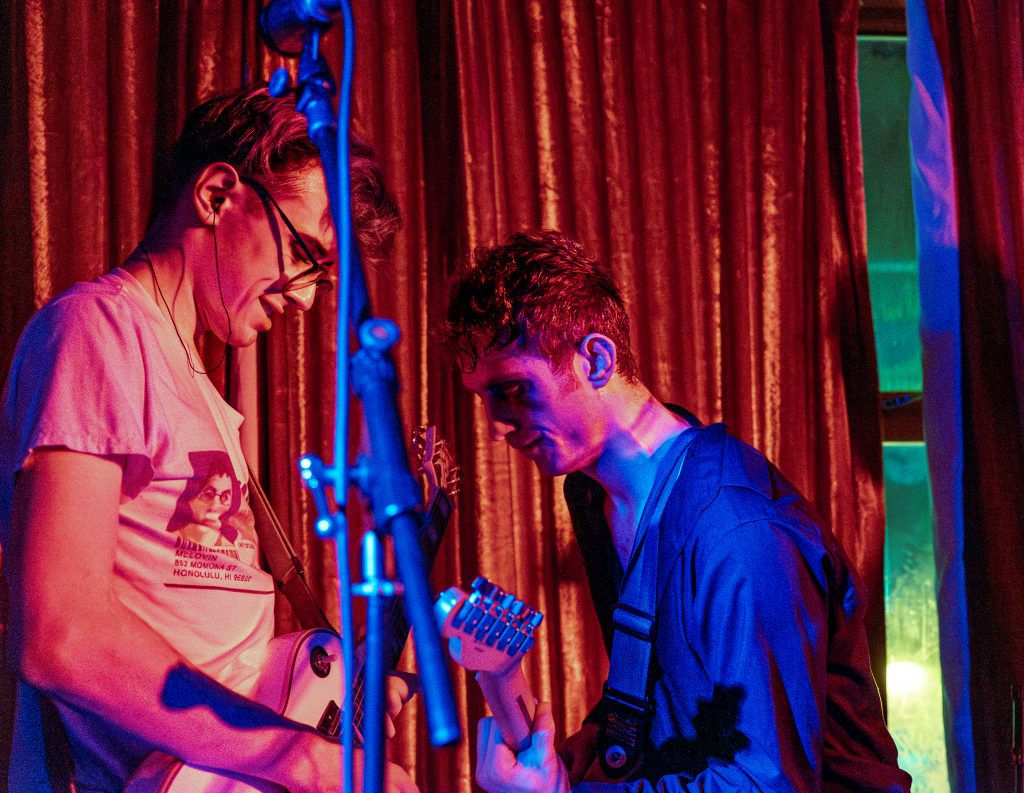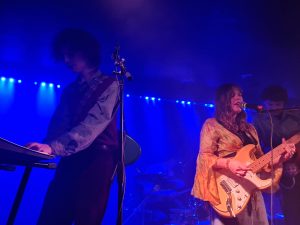
Salford is home to one of the UK’s best music courses and some of Manchester’s most exciting young bands, so why does the city still struggle to build a scene of its own?
On a wet Thursday night at The Pint Pot, a small crowd gather around a group of musicians. A few amps hum, the pints are cheap, and half the audience seems to be musicians themselves.
If you squint, you can almost believe you’re watching the start of something.
It’s a familiar story in Salford, the city where the next great Manchester bands quietly cut their teeth.
Maruja, Yaang, Slap Rash: three of the most exciting names Salford has recently produced, and all graduates of the University of Salford’s music courses.
The irony is hard to ignore. Salford is producing Manchester’s talent but not keeping it.
“The Uni is obviously really good at what it does,” says Dylan, a Salford musician, “but the city doesn’t seem to match that. You’d think with so many students, people would want gigs closer to home than Deansgate.”
Dylan’s frustration cuts to the core of a strange paradox.

The University of Salford has one of the country’s top-rated music courses, yet its campus and surrounding city offer little in the way of a live circuit.
“The student union used to be where bands formed and careers started,” says Siobhan Collins, another musician. “Now it’s just there to make money. Late-stage capitalism means the arts don’t matter, they’re too expensive, too much effort, and there’s no guarantee of profit.”
It’s a familiar comparison with other student cities. Leeds Beckett has its own 1000 capacity venue; Manchester students have Fuel, Big Hands, and The Peer Hat within walking distance.
Salford students, meanwhile, often must travel into the city for every gig, a small but symbolic reminder that their creative home doesn’t have room for them.
For many, the problem isn’t just about venues, it’s about class and investment. “Salford’s always been the more working-class part of Greater Manchester,” Siobhan says.
“People don’t have disposable income to spend on luxuries like live music and the council probably sees no reason to invest in it.”
There are only a handful of small venues, The Kings Arms, The Eagle Inn, with both sitting on the edges of the city, physically closer to Manchester.
“It’s just a strange gentrification pattern,” she adds. “You’ve got all this money pouring into Media City and Salford Central, but the main bulk of Salford stays the same.”
Every May, Salford briefly transforms. Sounds From The Other City paints the picture of a vibrant, offbeat, creative hub, a place where creative vulture thrives on its own terms.
But for Dylan, the festival is more façade than future.
“The whole thing’s a fallacy,” he says. “Suddenly there’s stuff happening at the Pint Pot and The Mill, and then the next week it’s gone. It’s like Salford gets to be cool for one day a year. It’s performative.”
Even last year’s reopening of Maxwell Hall felt, to some like a missed opportunity.
“It’s crazy to have one of the best pop music courses in the country and not even have a venue in the student union,” Dylan says.
For Tim from Blueprint Studios, the recording space that’s seen everyone from Elbow to BBC Radio 6 pull through its doors, the problem runs deeper.
“Money? Salford Council? Marketing? Social Media? Arts funding? You could ask the same question for any of Manchester’s satellites,” he says.
“Salford may protest, but Manchester has the bigger cultural history, nationally and internationally. Artists naturally associate themselves with that. They’re trying to write a ticket out.”
Tim remembers the pull himself. “Thirty years ago, I didn’t stay in Rochdale waiting for someone to open a venue. I went where things were happening,

that happened to be Manchester. But it could’ve been anywhere. We shouldn’t want our artists to aim low.”
He blames the collapse of grassroots infrastructure and the shift to an online culture
“There are more solo artists than bands now, people want to go viral, not play live.
“The infrastructure isn’t there. Venues either went bust during the pandemic or had to focus on safer bets like cover bands.
“But a change will come. It always does, one kid will reject Spotify, reject social media, something real again.”
As Louis Parry, another Salford musician, puts it: “Salford’s the smaller, dependent brother to Manchester.
“The last bug band to really claim Salford was The Ting Tings, after that everyone got absorbed into Manchester’s orbit.”
Louis makes the claim that the border is as much cultural as it is geographical, a twenty-minute bus that might as well be a border.
Salford’s creative paradox is painfully clear. It teaches the musicians who will fill who will fill Manchester’s next generation of venues, but it can’t offer them one of its own.
It has a university full of ideas, but not enough stages to share them.
And yet, beath the frustration, there’s hope in the open mics at The Pint Pot, or DIY collectives scattered around the city, and in the quiet ambition of students who refuse to accept that Manchester should always get the credit.
Salford doesn’t always need to borrow someone else’s legacy. It has one of its own, it just needs somewhere to play it, and people to support it.













Recent Comments